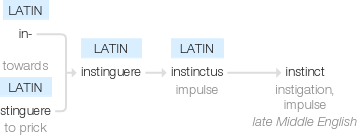Instinct
late Middle English (also in the sense ‘instigation, impulse’): from Latin instinctus ‘impulse’, from the verb instinguere, from in- ‘towards’ + stinguere ‘to prick’.
wiktionary
From Latin īnstinctus, past participle of īnstinguō(“to incite, to instigate”), from in(“in, on”) + stinguō(“to prick”). This etymology is incomplete. You can help Wiktionary by elaborating on the origins of this term.
etymonline
instinct (n.)
early 15c., "a prompting" (a sense now obsolete), from Old French instinct (14c.) or directly from Latin instinctus "instigation, impulse, inspiration," noun use of past participle of instinguere "to incite, impel," from in- "into, in, on, upon" (from PIE root *en "in") + stinguere "prick, goad," from PIE *steig- "to prick, stick, pierce" (see stick (v.)).
Meaning "animal faculty of intuitive perception" is from mid-15c., from notion of "natural prompting." General sense of "natural tendency" is first recorded 1560s.
Instinct is said to be blind--that is, either the end is not consciously recognized by the animal, or the connection of the means with the end is not understood. Instinct is also, in general, somewhat deficient in instant adaptability to extraordinary circumstances. [Century Dictionary]
